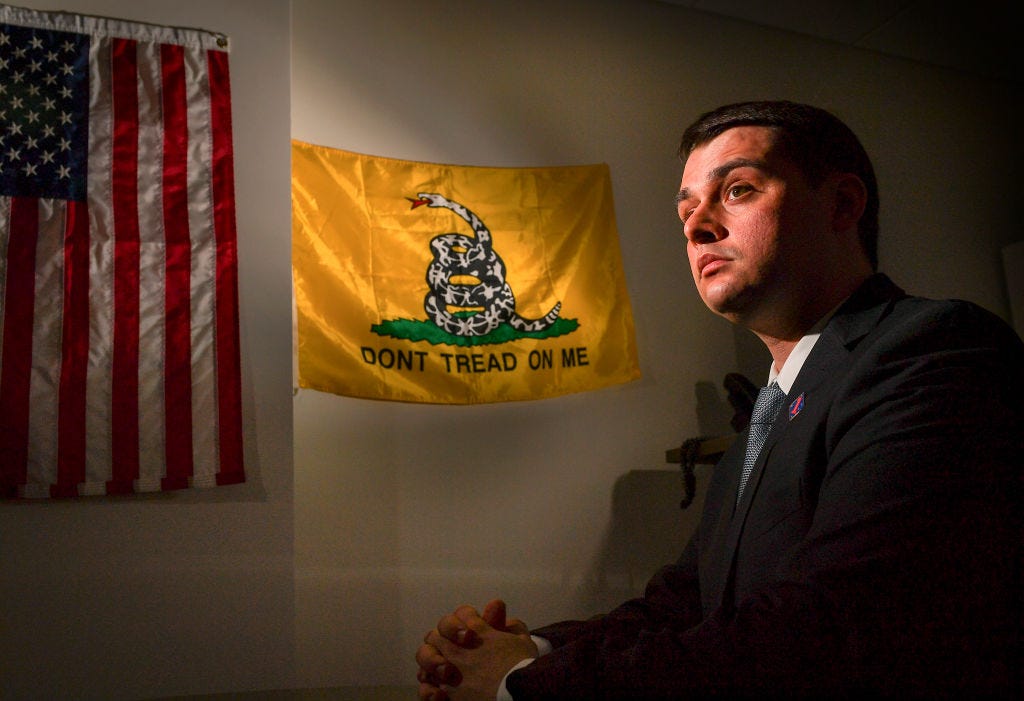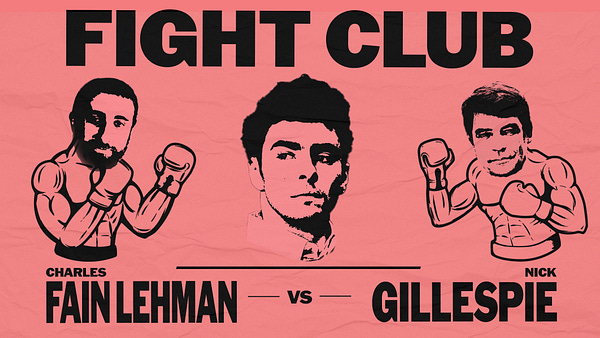
The Free Press

Before last night, the biggest margin of victory by a Republican in an Iowa caucus was 12 points, achieved by Bob Dole in 1988. Donald Trump blew that record out of the water with a lead of just under 30 points.
The networks called it for Trump after just thirty minutes of caucusing before many Iowans had even cast their votes—a move that led the DeSantis campaign to level the charge of “election interference” at a media “in the tank for Trump.”
With 95 percent of ballots counted, Trump had won 51 percent of the vote. DeSantis and Haley came a distant second and third at 21 percent and 19 percent, respectively. (Haley described her third-place finish as evidence that the primary was a two-horse race.) Vivek Ramaswamy came fourth with 8 percent and suspended his campaign late Monday night.
In his victory speech, Trump thanked his supporters and said he thought it “was time for our country to come together. . . whether it’s a Republican or Democrat or liberal or conservative.”
Many critics are asking: How is it possible that a man impeached twice by Congress and criminally indicted four times still has so much sway with the American heartland? How can Trump be so far ahead that were you to add Haley’s and DeSantis’s votes together, he’d still have a double-digit lead?
Part of the answer lies in the shortcomings of the man who started the race as his main opponent (more on that from Peter Savodnik in a second). But a far more important factor stems from the massive divide between college-educated and working-class voters. This gap isn’t just dividing Republicans and Democrats; it’s causing fractures within the parties themselves. As Batya Ungar-Sargon explains, that divide is still the engine of Trump’s strength. It’s also why, as she explains, “the average Republican voter hates the Republican Party.”
Why the average Republican voter hates the GOP—but loves Trump
By Batya Ungar-Sargon
To the surprise of no one and the dismay of the liberal commentariat class, former president Donald Trump has crushed the first GOP primary election.
Iowa, which voted twice for Barack Obama before flipping to Trump in 2016, gave Trump a decisive win Monday night. And in Iowa, as in the Republican Party and the country more generally, the class divide was the defining feature of the night.
According to MSNBC’s early entrance polls, Trump won voters without a college degree by 65 percent, to Florida governor Ron DeSantis’s 17 percent and former UN ambassador Nikki Haley’s scant 8 percent. Trump won college grads, too, but by a much slimmer margin—just 35 percent caucused for Trump. Haley, meanwhile, got nearly as many—33 percent, with DeSantis trailing at 23 percent. The AP had a similar breakdown.
That’s a 30-point gap in support for Trump—and a 25-point gap for Haley. It’s the gulf separating the college-educated from the working-class, who don’t just have different candidates of choice but different concerns, different struggles, and different priorities.
Working-class Americans are worried about the economy, immigration, our foreign entanglements, and the disappearing American Dream—all issues Donald Trump not only talks about but has a solid record on. Haley represents the GOP that Trump replaced—the free-market, chamber-of-commerce, nation-building version of the party that is dominated by a donor class whose interests are completely at odds with those of the working class.
Unfortunately for Haley, her party is now the party of the working class. In 2020, Bloomberg found that truckers, plumbers, machinists, painters, corrections officers, and maintenance employees were among the occupations most likely to donate to Trump (Biden got the lion’s share of writers and authors, editors, therapists, business analysts, HR department staff, and bankers.) As much as the Republican donor class wishes Haley were the party’s nominee, there’s no going back for your average corrections officer.
The thing liberals don’t understand about the average Republican voter in 2024 is that they hate the Republican Party. The average liberal feels well-represented by the Democratic Party because the Democrats’ base, like the party leadership, are college-educated elites. They share the same list of priorities. But the average Republican voter is working class and truly loathes the Bush-era version of the Republican Party, which meant tax cuts for the rich, failed wars, and an economic agenda that outsourced jobs to China.
Whether they realize it or not, this is why Democrats truly hate Trump. Without him, the left would soon have had a pretty permanent monopoly on power.
But if Iowa is any indication, not so soon after all.
And now, Peter Savodnik on the man who was supposed to save the Republican Party. . .
Where Ron went wrong
By Peter Savodnik
Ron DeSantis was supposed to be Serious Trump. Maybe a little lawyer-ish, a little stiff. But so what? Stiff meant competent. And wasn’t that what Republicans wanted? Didn’t they want to build the wall? Crush the administrative state? Just with a little less bluster?
Recall that after the Republicans’ disappointing 2022 midterms, DeSantis became the party’s “presumptive nominee” in 2024. On a night when 11 of the 21 candidates endorsed by Donald Trump lost—including Blake Masters in Arizona, Herschel Walker in Georgia, and Mehmet Oz in Pennsylvania—DeSantis expanded on his 2018 win by nearly 10 percentage points.
Seven months later, the Florida governor announced his presidential bid—in a very rocky Twitter Space rollout with Elon Musk—and soon after, he decamped to Iowa, racking up the endorsements of the state’s Republican governor, tons of state senators and representatives, and the highly coveted Bob Vander Plaats, the influential evangelical leader.
He did everything he was supposed to—and it wasn’t what Republican voters wanted.
They wanted the Duck à L’Orange, and they seemed convinced that anyone who wasn’t him was a squish.
Which is why Donald Trump trounced the whole Republican pack Monday in Iowa. At the time of writing, DeSantis looked like he’d come out on top in a close tussle with Nikki Haley for a distant second place. Little consolation given the expectations for his candidacy a year ago.
Team DeSantis insists that a big part of the problem is the conservative media ecosystem, and they’re not wrong. How else could their candidate lose?
As DeSantis said of Trump last week while stumping: “He’s got basically a Praetorian Guard of the conservative media—Fox News, the websites, all this stuff. They don’t hold him accountable because they’re worried about losing viewers, and they don’t want to have their ratings to go down.”
Few defeats more powerfully illustrate what we’ve known since 2016: that the old rules no longer matter, that no one cares if you did a brilliant job holding down the proverbial fort in Florida. What they care about is that you not simply enact, but, more importantly, embody your agenda. If you’re not angry enough—or entertaining enough—then your agenda isn’t a real agenda. It’s a fake politics probably conjured up by some deep-state AI.
Final thought: it’s utterly mystifying how it is that this keeps happening, that the politicians are still playing catch-up eight-and-a-half years after Trump descended his gilded escalator, that they have yet to intuit what he knew way back when—that America is broken and coasting and cracking up, and if you’re still adhering to the stale strictures, you don’t really get it.
Ron DeSantis was supposed to implement the Trump agenda and make his party serious again and forge a national coalition that would bring together conservatives and economic populists and maybe even a few old-fashioned liberals, and he failed because he didn’t grasp how deep the rage runs.
For now, alas, only one man in the race gets that.
From our newsroom: Iowa FOMO
This time last year, my colleague Francesca Block had January 15, 2024, circled on her calendar. Formerly a reporter at The Des Moines Register, yesterday would have been her D-Day. But then life intervened and she joined The Free Press last September. So I asked her: Does she have FOMO, and what do her old Iowa contacts and colleagues make of this year’s caucus, with its record-setting low temperatures and a front-runner a long way ahead throughout the race?
My friends back in Iowa told me it was so cold yesterday that their eyelashes froze as soon as they stepped outside. The highways have been full of rolled-over cars in ditches from the slick, slippery roads in recent days. One of those stranded cars had Vivek Ramaswamy in it, who had the ultimate Iowa experience when a nice local man pulled over to help him push his SUV out of the ditch. (Iowa nice is a real thing, people.)
So it might sound weird to say I was sad not to be there yesterday. There’s no place like Iowa—it’s the only place in the country where a local Pizza Ranch turns into a political salon, in which important questions are asked about our society by the everyday people so often left out of the mainstream media’s narratives.
Take 63-year-old Iowan Doug Stout, who lives in Dallas County just west of Des Moines. I met Doug last March at a local barbecue joint in a Des Moines suburb at an event for Asa Hutchinson, the former Arkansas governor who at the time was flirting with a presidential run. Since then, Doug has been to more than a dozen caucus events with an open mind—meeting face-to-face with 15 different candidates as they traversed the state, trying to make their case to Iowans. He’s seen Ron DeSantis and Nikki Haley at least five separate times each, he told me over the phone as he prepared to head out for the night to caucus in the subzero temperatures. He revealed that he’d be caucusing for Haley.
“I think people underestimate just how seriously Iowans take the job of electing somebody,” he said. “Just ask any of the candidates; they’ll tell you they get questions here they don’t get anywhere else. They really find out not just what the candidates stand on, but they try and get a feel for who they are.”
At the end of the day, though, it seems Iowans are less concerned about who actually won the caucus than who made it to caucus day in the first place. Stout told me the myth about Iowa is that the state is supposed to “choose the president.”
“Everybody focuses on who wins. Everybody focuses now on who’s gonna finish second, but Iowa’s job has always been to winnow the field, and we did that already,” he said.
As he pulled on his winter coat and prepared to drive on the slick roads just over three miles to participate in his 12th presidential caucus, Stout told me it feels very bittersweet. While he’s glad the increasingly ugly political ads will stop taking over his TV and his phone will soon be free of campaign text messages (he told me he’s gotten seven a day from different campaigns every day in the past week), he said, “I’m not always glad when caucus day or election day gets here.
“It’s like, I love football. I love football season. But I don’t really enjoy the Super Bowl because it’s kind of the end,” he said. “It’s kind of anticlimactic, and plus, the next day it’s over. It’s very much a change in the pace of political life in Iowa after an intense 10 months.”
Fentanyl for minors
Scrolling through headlines, there’s one question I find myself asking more and more often: What the heck is going on in Canada? From race-based criminal sentencing to media censorship, Canada seems determined to become a world leader in progressive illiberalism. Thankfully, we have one of the great explainers of Canadian craziness on staff here at The Free Press: the mighty Rupa Subramanya. Rupa has covered a lot of big north-of-the-border stories for us, including the furor over the truckers’ protest and Canada’s rapidly expanding euthanasia industry.
And so when I read about a scheme in British Columbia that provides minors access to fentanyl without parental consent—yes! For real!—I asked Rupa to explain what was going on.
Here’s her report:
Since 2020, British Columbia has made a point of providing a “safer supply” of fentanyl to addicts—and, more recently, it has loosened the rules, making it easier for doctors and nurses to prescribe the highly addictive drug to even more people.
That includes minors, who do not require a parent’s permission to get a prescription.
The provincial government did not publicize this change—which took effect in August 2023—and most Canadian media has steered clear of the story.
That could be because many Canadian parents are worried about their children getting hooked, or overdosing, on fentanyl. Drug overdose is now the leading cause of death among 10- to 18-year-olds in British Columbia.
In April of last year, a five-year-old girl in Nanaimo, British Columbia, just west of Vancouver, accidentally stumbled on a packet of fentanyl at school. Thankfully, her mother found the drugs before anything happened.
British Columbia’s fentanyl policy is in keeping with other Canadian innovations such as medical assistance in dying (MAID), Canada’s euthanasia program that, come March, will be available to those suffering from psychological disorders like anorexia and may be extended to “mature minors” in the future. (I wrote about MAID for The Free Press in 2022.)
The new fentanyl policy also dovetails with a British Columbia pilot program launched in January 2023 that legalized small amounts of drugs such as heroin, meth, crack cocaine, and ecstasy.
With a population of roughly five million—a little less than one-eighth of Canada’s population—British Columbia has accounted for about a third of all 32,000 drug-related deaths in Canada since 2016.
Julian Somers, a clinical psychologist at Simon Fraser University, just outside Vancouver, told me that the new British Columbia fentanyl policy—distributing a highly addictive drug at pharmacies and clinics—has never been tried anywhere else.
“Rather than taking steps to actively reduce risks, which we’re clearly not doing—it’s not even discussed—our current policies have the appearance of actively contributing to increased risk,” Somers said.
Meanwhile, in Hollywood. . .
For ink-stained wretches like us, it’s hard to imagine a more exciting, more glamorous event than the Iowa caucus. But apparently there was something else going on last night in Hollywood.
The big winners at the Emmys were Succession, Beef, and The Bear. (Here’s a full list of who won what.) But the bruising streaming wars have entered a penny-pinching phase—get ready for AI scripts and more ads—while younger audiences continue to look elsewhere for their entertainment. Which leaves us asking: Is truly must-watch TV getting rarer?
This month marks 25 years since the first episode of The Sopranos aired. And in an interview with The Times of London to mark the anniversary, the show’s creator, David Chase, said the golden age of television is officially over. “Something is dying,” he said, lamenting the collapse of the big streamers and the pressure to serve an audience with ever-shorter attention spans.
Is Chase right? Ian Martin thinks so. Martin is the writer of some of the funniest political comedies of all time—Veep and its British progenitor The Thick of It. He argues that the golden age of TV has died along with the end of HBO’s Succession—whose fourth and final season was nominated for 27 Emmys. (It won six Emmys last night, including Outstanding Drama Series, and Kieran Caulkin admitted he still hasn’t seen the show’s final episode.)
Read Ian’s argument in full here:
Oliver Wiseman is a writer and editor at The Free Press. Follow him on X @ollywiseman.
Become a Free Press subscriber today:





















I'm not surprised tv is dying. Span of show time is too frequently broken up by advertising.
Lots of people with lots of gripes. We're all Americans folks. When we bastardize each other, we do the work of the Republicans and the Democrats. They just sit back and watch us fight. You know who I'm really mad at? My bank, my insurance company, corporate America, a $7.50 minimum wage, the tax code, the cost of education, the Federal Reserve, jobs that were outsourced to China, etc. Y'know, the things that really matter to us as citizens of the greatest country on the planet, now, in the past and in the future (if we can get it together). You need to stop bitchin'. There's a reason we're not referred to as The Greatest Generation. We've had it too good for too long. We're all a bunch of spoiled babies.